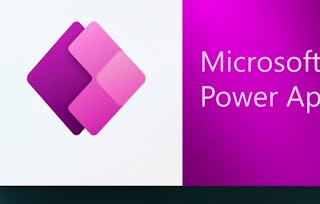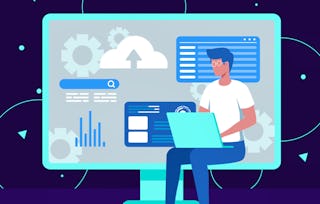Take your Power Platform development skills to the next level with this advanced, hands-on course. Build enterprise-ready canvas and model-driven apps, design powerful workflows using Power Automate, and create secure, scalable business solutions with Microsoft Dataverse and custom APIs.

Ends soon: Gain next-level skills with Coursera Plus for $199 (regularly $399). Save now.

Advanced Power Platform: Connectors, Components & Automation
This course is part of PL-400: Training for Power Platform Developer Exam Specialization

Instructor: Board Infinity
Included with
Recommended experience
What you'll learn
-Build canvas and model-driven apps using Power Apps, Dataverse, and advanced layout and navigation techniques
-Develop automated workflows with Power Automate using conditions, loops, triggers, and error handling for business processes
-Apply Power Fx and JavaScript to implement scalable business logic and enhance user interaction in apps
-Create custom plug-ins and APIs using C# to extend app functionality and meet specific enterprise requirements
Skills you'll gain
Details to know

Add to your LinkedIn profile
August 2025
12 assignments
See how employees at top companies are mastering in-demand skills

Build your subject-matter expertise
- Learn new concepts from industry experts
- Gain a foundational understanding of a subject or tool
- Develop job-relevant skills with hands-on projects
- Earn a shareable career certificate

There are 3 modules in this course
In Module 1, learners gain hands-on experience developing powerful Power Apps starting with Canvas Apps. They explore advanced layout and control techniques, learn to craft complex Power Fx expressions, manage variables and collections, and integrate with multiple data sources such as Dataverse, SharePoint, and Excel. Next, the focus shifts to Model‑Driven Apps, where learners create and customize Dataverse tables and relationships, design views and forms, and implement business rules and automated workflows for real-world use cases. The module rounds out with Dataverse essentials for developers, where students design schema relationships (1:N, N:1, N:N) and configure security roles and field-level permissions. Through practical labs—like building multi-screen canvas apps and model-driven prototypes—and targeted quizzes, participants build the skills required to meet PL‑400 exam goals around Power Apps enhancements, Dataverse modeling, and app security as described in Microsoft’s official study guide
What's included
13 videos4 readings4 assignments1 discussion prompt
In Module 2, learners explore how to design and build business process automation using Power Automate. Starting with foundational concepts, they create automated, scheduled, and instant flows, working with connectors, triggers, actions, conditions, loops, expressions, and variables. They then progress to advanced flow techniques, including configuring error handling via Run After settings and scope blocks, constructing parallel branches, delays, Do Until loops, switch controls, and optimizing flow performance. The module culminates in real-world automation scenarios, such as approval workflows integrated with Dataverse, SharePoint, and Outlook; managing flow ownership and sharing; and enforcing flow security governance.
What's included
13 videos3 readings4 assignments
In Module 3, participants advance their Power Platform development skills by embedding custom business logic and scripting within applications. Learners start by applying Power Fx expressions and workflow logic in Canvas Apps and Power Automate to dynamically manage UI behavior and automate data handling. Next, they explore client-side scripting in Model‑Driven Apps using JavaScript or TypeScript, focusing on the Dataverse Client API object model—writing and registering event handlers, manipulating fields dynamically, and invoking the Web API to implement logic that goes beyond built-in business rules. The module then transitions to server-side extensibility, teaching learners to design and develop Dataverse plug‑ins using C#. They explore execution pipeline contexts (including pre- and post-images), custom API actions, and plugin registration using Dataverse tools. Hands-on labs reinforce this learning, guiding students to script UI behaviors, configure event handlers and plug-ins, and invoke custom API actions—directly targeting PL‑400 exam domains like Extend the user experience and Extend the platform.
What's included
13 videos3 readings4 assignments
Earn a career certificate
Add this credential to your LinkedIn profile, resume, or CV. Share it on social media and in your performance review.
Instructor

Offered by
Explore more from Cloud Computing
 Status: Free Trial
Status: Free TrialBoard Infinity
 Status: Free Trial
Status: Free Trial Status: Free Trial
Status: Free Trial Status: Free Trial
Status: Free Trial
Why people choose Coursera for their career





Open new doors with Coursera Plus
Unlimited access to 10,000+ world-class courses, hands-on projects, and job-ready certificate programs - all included in your subscription
Advance your career with an online degree
Earn a degree from world-class universities - 100% online
Join over 3,400 global companies that choose Coursera for Business
Upskill your employees to excel in the digital economy
Frequently asked questions
Not at all. The course starts with low-code tools like Power Apps and Power Automate. Basic logic is helpful, but full coding experience isn’t required.
You'll work with Power Apps (canvas and model-driven), Power Automate, Dataverse, Power Fx, JavaScript, and plug-ins using C#. All tools are introduced gradually.
The course is designed for 3 weeks of study, with 4–6 hours of weekly commitment, including video lessons, labs, quizzes, and practical exercises.
More questions
Financial aid available,

